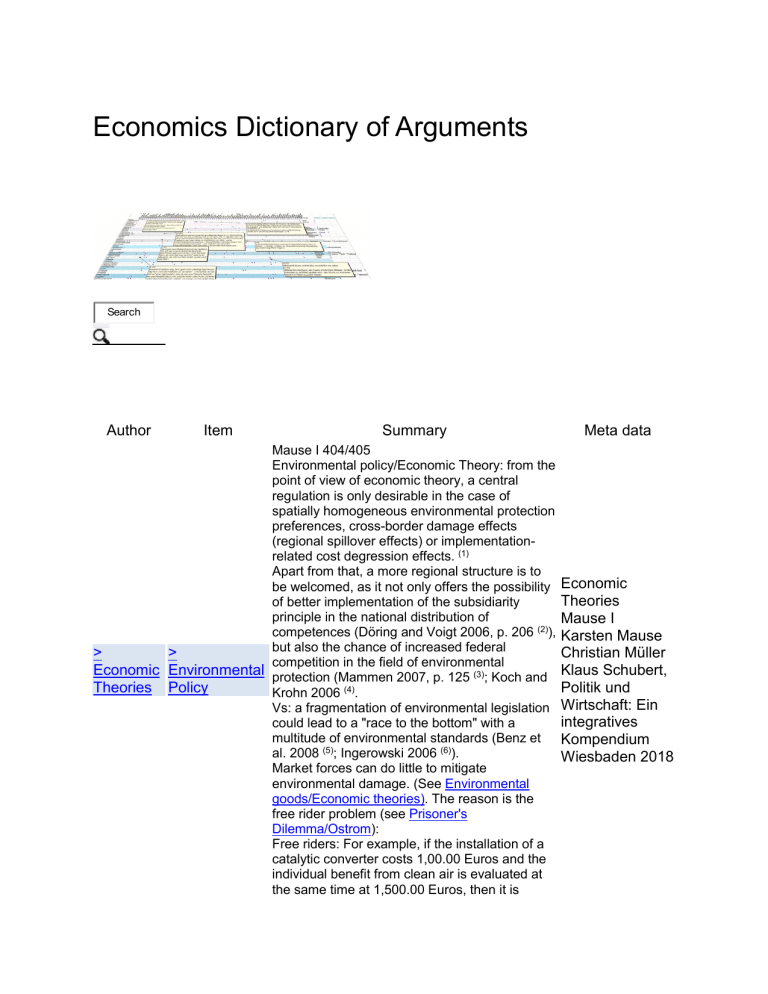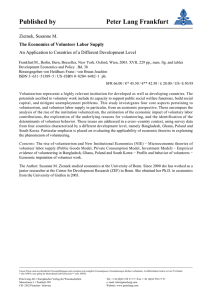
Economics Dictionary of Arguments Search Author Item Summary Mause I 404/405 Environmental policy/Economic Theory: from the point of view of economic theory, a central regulation is only desirable in the case of spatially homogeneous environmental protection preferences, cross-border damage effects (regional spillover effects) or implementationrelated cost degression effects. (1) Apart from that, a more regional structure is to be welcomed, as it not only offers the possibility of better implementation of the subsidiarity principle in the national distribution of competences (Döring and Voigt 2006, p. 206 (2)), but also the chance of increased federal > > competition in the field of environmental Economic Environmental protection (Mammen 2007, p. 125 (3); Koch and Theories Policy Krohn 2006 (4). Vs: a fragmentation of environmental legislation could lead to a "race to the bottom" with a multitude of environmental standards (Benz et al. 2008 (5); Ingerowski 2006 (6)). Market forces can do little to mitigate environmental damage. (See Environmental goods/Economic theories). The reason is the free rider problem (see Prisoner's Dilemma/Ostrom): Free riders: For example, if the installation of a catalytic converter costs 1,00.00 Euros and the individual benefit from clean air is evaluated at the same time at 1,500.00 Euros, then it is Meta data Economic Theories Mause I Karsten Mause Christian Müller Klaus Schubert, Politik und Wirtschaft: Ein integratives Kompendium Wiesbaden 2018 Economics Dictionary of Arguments Search Author Item Summary rational for the individual not to install the catalytic converter. This even applies if everyone else dispenses with installation. For society as a whole, this leads to the worst result. Therefore, in most cases, the state must intervene to contain environmental damage. (Nordhaus 1993, p. 18) (7), Hartwig 1992, p. 132) (8). See Externalities. 1. Klaus W. Zimmermann & Walter Kahlenborn, Umweltföderalismus. Einheit und Einheitlichkeit in Deutschland und Europa. Berlin 1994. 2.Thomas Döring & Stefan Voigt. 2006. Reforming federalism German style. Intereconomics 41: 201– 208. 3. Lars Mammen. 2007. Der neue Typus der konkurrierenden Gesetzgebung mit Abweichungsrecht. Die öffentliche Verwaltung 9: 376– 379. 4. Hans-Joachim Koch, &Susan Krohn. 2006. Umwelt in schlechter Verfassung? Der Umweltschutz nach der Föderalismusreform. Natur und Recht 28: 673– 680. https://link.springer.com/ article/10.1007%2Fs10357-006-1144-3 5. Arthur Benz, Arthur, Hans-Joachim Koch, André Suck & Anna Fizek, Verwaltungshandeln im Naturschutz: Herausforderungen und Folgen veränderter Rahmenbedingungen. Münster 2008.. Meta data Economics Dictionary of Arguments Search Author Item Summary Meta data 6. Jan B. Ingerowski, J2006. Die Föderalismusreform: Chance auf ein stringentes, an den aktuellen Herausforderungen des Umweltschutzes orientiertes Umweltrecht vertan. KGV-Rundbrief 3 + 4/ 2006. 7. William D. Nordhaus. 1993. Reflections on the economics of climate change. The Journal of Economic Perspectives 7: 11– 25. 8. Karl-Hans Hartwig, Umweltökonomie. In Vahlens Kompendium der Wirtschaftstheorie und Wirtschaftspolitik, Hrsg. Dieter Bender, Hartmut Berg, Dieter Cassel, Günter Gabisch, Karl-Hans Hartwig, Lothar Hübl, Dietmar Kath, Rolf Peffekoven, Jürgen Siebke, H. Jörg Thieme und Manfred Willms, Bd. 2, 5. Aufl., 122– 162. München 1992. _____________ Explanation of symbols: Roman numerals indicate the source, arabic numerals indicate the page number. The corresponding books are indicated on the right hand side. ((s)…): Comment by the sender of the contribution. The note [Author1]Vs[Author2] or [Author]Vs[term] is an addition from the Dictionary of Arguments. If a German edition is specified, the page numbers refer to this edition. Authors A B C D E F G H I J K L M N O P Q R S T U V W Z Concepts A B C D E F G H I J K L M N O P Q R S T U V W Z Home List view Tables Log-in and Sign-in Last edit June 2019 Legal Notice Contact Data protection declaration
